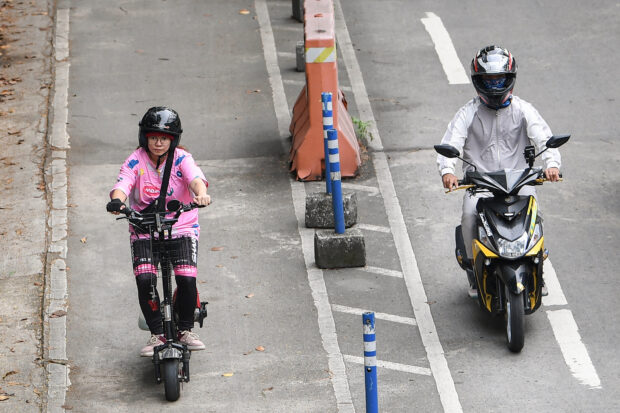
A motorist (R) speeds past a woman riding an electric bike along a street in Manila on November 24, 2023. (AFP)
MANILA, Philippines — The Department of the Interior and Local Government (DILG) on Monday instructed local government units (LGUs) to plan routes where electric vehicles (e-vehicles) are permitted to operate in accordance with the Electric Vehicle Industry Development Act (Evida Law).
This comes amid concerns about the proposed regulations on the use of light e-vehicles, including e-bikes and e-trikes, across the country.
“As early as now, create routes where these so-called electric vehicles will pass through. This isn’t an order from the DILG or MMDA [Metropolitan Manila Development Authority]. This is a law,” Interior and Local Government Secretary Benhur Abalos said in a statement.
Under the Republic Act No. 11697 or Evida Law, e-vehicles must be given routes created or identified by LGUs and approved by the Department of Transportation (DOTr).
Abalos added that a technical working group is already investigating traffic concerns in Metro Manila, including the use of e-vehicles.
“(In) the meantime, the status quo is still being implemented to prevent disorder,” Abalos said.
Policies on requiring light e-vehicle riders to carry driver’s licenses and to register their units were raised after the MMDA and the Metro Manila Council (MMC) passed a resolution banning e-bikes and e-trikes on the major roads in Metro Manila.
The MMC, however, said that it is still ironing out the details of the ban’s implementation on April 15.
In the same statement, Abalos stressed that vehicle registration and driver’s licenses should be mandatory for anyone who owns and drives e-vehicles with a speed limit of 26 to 56 kilometers per hour.
The Land Transportation Office (LTO), however, previously said that it has also yet to develop guidelines on requiring e-vehicle drivers to have driver’s licenses nationwide, saying that it is still consulting with various stakeholders on the matter.
“In as much as we want to set the rules for them, there are various factors that must be considered like an existing law that promotes their ownership and use, as well as the programs and projects by local government units using these e-vehicles for their constituents,” LTO chief Vigor Mendoza II said in a previous statement.